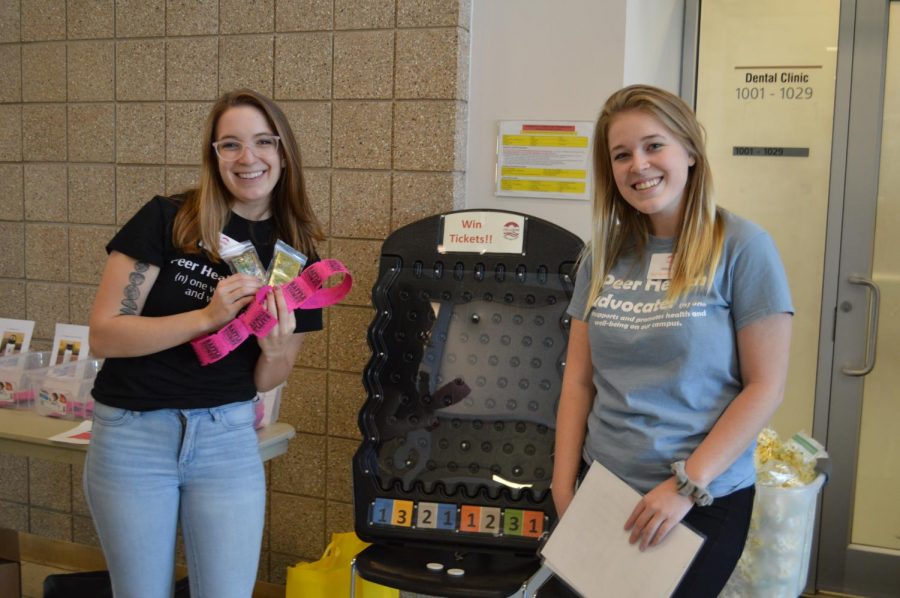Student Health Center event offers free STI testing for students
October 20, 2019
“From a winter cold to a broken bone, we’re here to help!” This tagline can be found under the services tab on the University of Wisconsin-La Crosse Health Center page. But on Thursday, Oct. 17 their annual free STI Testing event was the resource for students.
Twice a year the Student Health Center offers students at UWL and Western Technical College the opportunity to come in and get tested for Chlamydia, Gonorrhea, and HIV, with no charge to their student accounts or bank accounts. The STI Clinic began as a singularly hosted event in the Spring semester but expanded to accommodate a student demographic with the addition of a second testing opportunity, said physician Phyllis Schneider. 2019 will be the Fourth Anniversary for the STI Testing event at the Student Health Center
Peer Health Advocates Abbey Robbers and Lilli Minor were present, running educational games and handing out raffle tickets. According to Robbers, their goal on campus is to promote wellness on campus by doing activities like the STI testing, as well as other educational services such as residence hall mental health education, sexual education, violence prevention, and alcohol awareness.
“Having things like this is super helpful. Not only the clinic but every week they have walk-in hours for Chlamydia Gonorrhea and HIV— which is super helpful. We’re constantly working to have resources available, as well as condoms available, in the Student Life Office. We’re really trying to get the message out there that these things are available for everyone so that everyone can practice safe sex,” said Robbers.
Abby Deyo, physician, medical supervisor, and interim director of the Student Health Center, also mentioned the Student Life Office in her appraisal of UWL health services:
“We work pretty closely with the Wellness Department, which is through Student Life, on the educational cases, most of the educational programming is offered through residence life— but not all of it. There are also some other programs like the Breakfast and Birth Control, and Condom Bingo. We also do a lot of social media like campaigns. And of course when people are here for visits, a big part of our initial screening process is, do they need any additional education relating to sexual health?” said Deyo
Deyo said that the biggest prerogative of Student Health Center workers and volunteers is to promote bodily responsibility and to encourage students to habitually partake in safe-sex practices. “The main thing we are trying to do is raise awareness of sexually transmitted infections, with our students, and that’s for both UWL and Western Technical College, we serve both student groups. Awareness of the need to test and also safe sex practices to avoid the need for center visits,” said Deyo.
The waiting room was full of students from both UWL and Western Technical College— accompanied by a spread of food for the patients-in-waiting.“Because they [UWL] do things like this, free STI clinics, it promotes a safe-sex campus. I think our climate is pretty good,” said an anonymous student who was partaking in the STI clinic services, “I think safe-sex practices are pretty normalized, they have a lot of groups, and things like this that make it feel like a less uncomfortable subject, which makes it more normal.”
Deyo mentioned comfortability as a facet of the center’s professional routine. “We have pretty routine screening and routine questions on physicals, we have a walk-in STI screening clinic where you don’t have to have an appointment, as long as you don’t have any symptoms that would make us thing you would need to talk to a healthcare provider, you can get a screening in a private, non-embarrassing sort of way.”
Deyo also made clear that the Student Health Centers’ number one priority is student wellness, and recognizes that sexual practices often play into the intersectionality of the concept of health. She emphasized the importance that sex be safe before students come to the clinic. “We don’t want, of course, the fact that we do STD testing to mean it’s okay for students to go out and have all the sex that they want because they think we can just treat them if they get something. Sometimes that process does tend to miss that educational piece, though we always try to include it.”
When asked about the climate surrounding sexual education and awareness on the UWL campus, Deyo said that as a physician she wants to see healthy students, and is happy to contribute to the situation in whatever way she can.“I think the idea that health is a priority, is an important one,” said Deyo “We try to put that out there for students, and UWL has a lot of resources compared to other campuses— so if there’s something that you need, there’s almost always an office with resources to help.”







